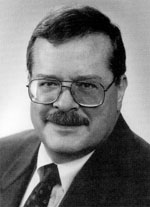Mr. Duncan H. Lawrie
Professor
University of Illinois, Urbana-Champaign

Duncan H. Lawrie is a professor of computer science at the University of Illinois at Urbana-Champaign. Having published extensively on the subject of design and evaluation of computer architecture, he has also served as head of the Computer Science Department at Illinois and as chair of the Science Advisory Board of the Supercomputing Research Center. He designed and implemented the first high-level language for the Illiac IV, designed the array memory system for the Burroughs scientific processor, and directed the development of the systems software for a prototype large-scale, shared-memory multiprocessor known as Cedar.
Lawrie has served on numerous government advisory groups including a Department of Energy panel to design a five-year plan for applied mathematical sciences and a National Science Foundation committee on alternative technologies for class VI computing. He also served on a National Research Council committee on supercomputer performance evaluation and on one of the early committees of the Federal Coordinating Council on Science and Engineering Technology which made recommendations for national policies on high performance computing.
A Fellow of the Institute of Electrical and Electronics Engineers, Lawrie was president of the IEEE Computer Society in 1991. He is presently editor-in-chief of the IEEE Transactions on Parallel and Distributed Systems and chairs the electronic publishing committee of the IEEE Computer Society. He was co-chairman of the Symposium on High Speed Computer and Algorithm Organization, program co-chairman of the Ninth International Conference on Parallel Processing, and general chairman of the Fourth International Conference on Distributed Computing Systems. He also has served as an editor of the Computer Architecture and Systems Department of the Communications of the ACM.
